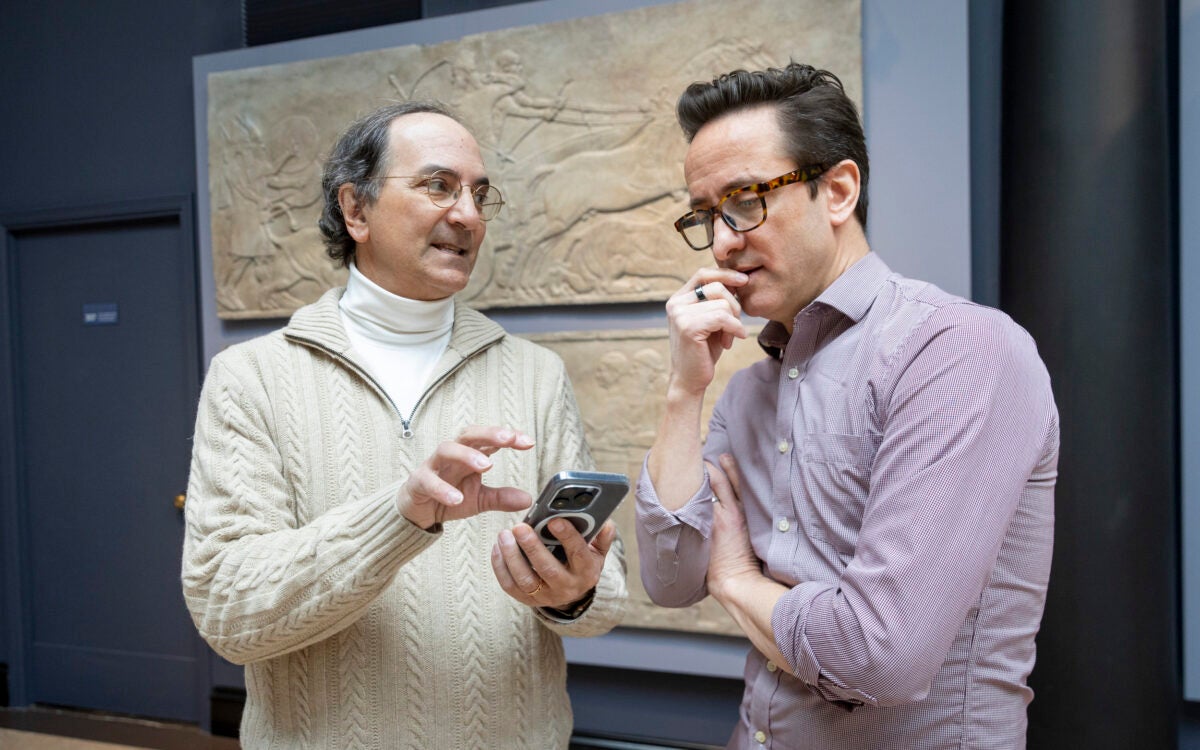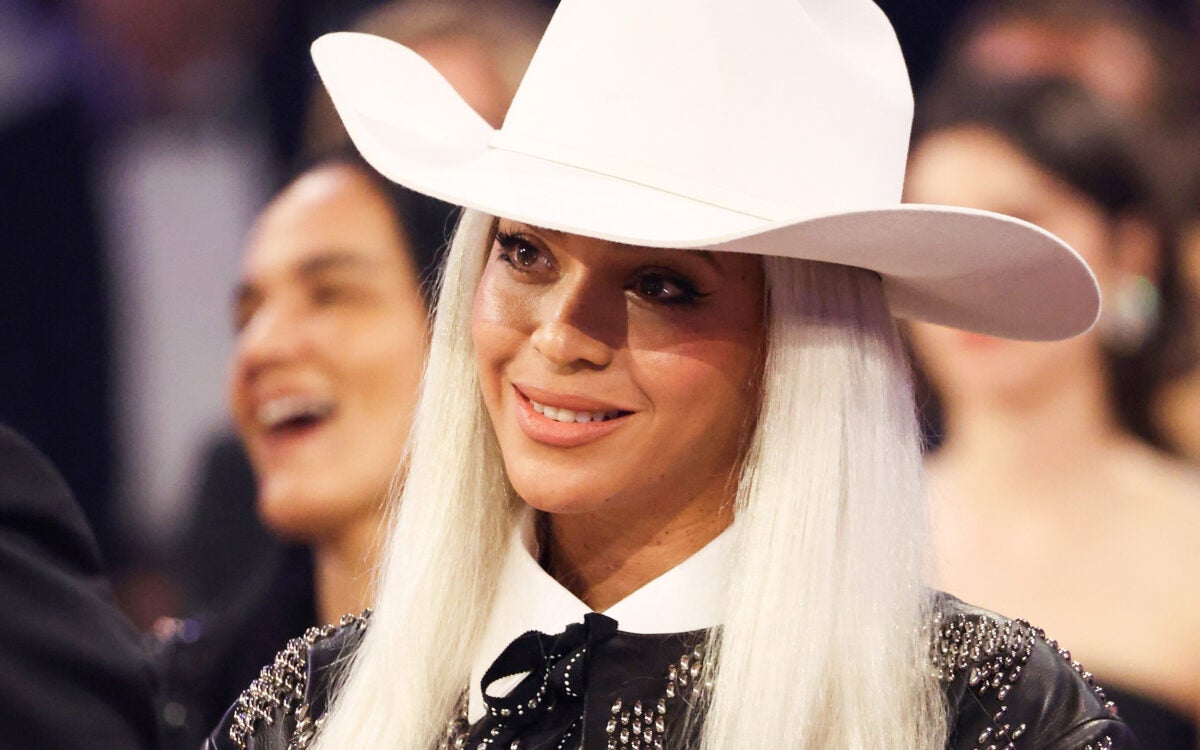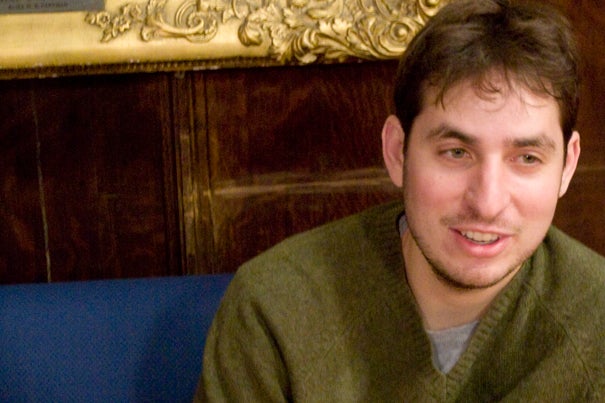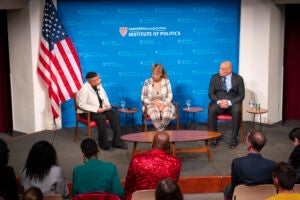Arts & Culture
-

Arts First to kick off biggest festival yet
Departing longtime leader reflects on two decades of growth
-

Art from a long-dead civilization springs back to life
Moving experience at the Museum of the Ancient Near East adds ‘layer of mixed reality’ to exhibits
-

All the world’s a stage
Richard Sennett urges revitalizing public life, spaces, politics by creating spaces that engage imagination
-

Are humanities stuck in ivory tower? Should they be?
Two literature scholars wrestle over whether and how professors can engage with pressing political, social issues of day
-

Courtney B. Vance, Angela Bassett honored as Artists of the Year
Cultural Rhythms’ weeklong celebration highlights student performers, food, and fashion
-

Is Beyoncé’s new album country?
Release ignites hot talk about genre’s less-discussed Black roots, what constitutes authenticity
-
Harvard University Library awarded $5M grant from Arcadia Fund
Britain’s Arcadia Fund has awarded $5 million to the Harvard University Library. Arcadia’s five-year grant will provide flexible support for the library’s core functions: acquisitions, access, preservation, and dissemination.
-
The pogrom that transformed 20th century Jewry
On April 8, 1903 — Easter Sunday — a mild disturbance against local Jews rattled Kishinev, a sleepy city on the southwestern border of imperial Russia.
-
Scholar enjoys wrestling ‘the Great Bear’
Some scholars are hard-pressed to identify what exactly drew them to their field. Others can point to a specific “aha!” moment when they found their academic calling. In Justin Weir’s case, it all began with a bit of bureaucracy.
-
National Endowment for the Humanities supports preservation of Qajar dynasty
The National Endowment for the Humanities has made a $346,733 grant to a team of Qajar historians. The purpose of this grant, which lasts from May 2009 to June 2011, is to develop a comprehensive digital archive and Web site at Harvard University that will preserve, link, and render accessible primary source materials related to the social and cultural history of women’s worlds during the reign of the Qajar dynasty (1785-1925) in Iran.
-
Cinematic reverberations
The writing of culture watcher and critic Louis Menand — Harvard’s Anne T. and Robert M. Bass Professor of English — has cast a wide net over the years.
-
Poet/critics and the state of the art
A triumvirate of prominent poet-critics – each with strong Harvard ties – took on the meaning of contemporary poetry last week. And despite a lively discussion, none of them provided a comprehensive definition.
-
Gail Mazur reads at Radcliffe
After removing her soaked red sneakers, Radcliffe Fellow Gail Mazur read aloud from new poems Monday (April 6) in dry black socks. The poet was undeterred by the onslaught of gray rain that thrashed Radcliffe Gymnasium’s windows — a fitting backdrop for Mazur’s charged, emotional poems.
-
Creativity through cerebration
Contemporary composer Kay Rhie hasn’t had many watershed musical moments. The romantic ideal of a composer “deeply entrenched in creative epiphanies,” she admitted on a recent damp spring afternoon, is “not my story.”
-
Atkins, Dennehy to perform poems of T.S. Eliot
In the first lines of “The Waste Land,” a touchstone of modernist poetry from 1922, T.S. Eliot offers an ambiguous view of the very month we are in: April is the cruellest month, breeding Lilacs out of the dead land, mixing Memory and desire, stirring Dull roots with spring rain.
-
History of a ‘scribal machine’
Starting in the 1920s, Chinese writer Lin Yutang earned a reputation as an urbane essayist and translator who moved easily between the literary cultures of the East and West.
-
OfA, OCS name 2009 Artist Development Fellowships
The Office for the Arts at Harvard (OfA) and Office of Career Services (OCS) are pleased to announce the 2009 recipients of the Artist Development Fellowship (ADF). This program supports the artistic development of students demonstrating unusual accomplishment and/or evidence of significant artistic promise. The ADF program represents Harvard’s deep commitment to arts practice on campus and provides financial support for the creative and professional growth of student artists.
-
Peabody preserves rare daguerreotypes
Thirty-six rare daguerreotype portraits from the Peabody Museum of Archaeology and Ethnology have recently been stabilized and preserved for future generations, in collaboration with the Weissman Preservation Center at Harvard University Library and the Mellon Foundation. Until photo conservators got to work, some daguerreotypes were nearly obscured by the deterioration of glass and other components, while others suffered from cracked or broken cases.
-
Playwright plumbs texts, ancient and modern
You know Noh, no? Chiori Miyagawa does. The Bard College playwright-in-residence, a Radcliffe Fellow this year, has steeped herself in Noh theater, a measured style of Japanese drama that dates back to the 14th century. It’s one of the many literary echoes — some old, some ancient — that she brings to her work. “I often time travel,” Miyagawa told a lecture audience March 16 at the Radcliffe Gymnasium. “It’s my favorite thing to do as a playwright.”
-
Drawing from history
History and art are intricately linked in “Wiyohpiyata: Lakota Images of the Contested West,” a new exhibit at Harvard’s Peabody Museum of Archaeology and Ethnology based on a collection of drawings by Native American warriors. “It’s so rich. It’s such a complex, interesting document that has so many stories embedded in it,” said the show’s co-curator Castle McLaughlin of the “artists book” that inspired the exhibition.
-
Yu Hua reads work, participates in star-studded panel at Fairbank event
It’s strange to imagine your dentist as one of the most interesting and controversial novelists of the 21st century. But that’s just what Yu Hua is. Or was — the former dentist who admitted, more frighteningly, that he possessed little formal dental training, recently derided his former profession to a New York Times reporter, saying, “The inside of a mouth is one of the ugliest spectacles in the world.”
-
Geospatial Library relaunched
Following a yearlong process of redesign and testing, the University Library’s Office for Information Systems has relaunched the Harvard Geospatial Library (HGL), the University’s catalog and repository of data for geographic information systems (GIS). The new HGL offers an enhanced user experience through new functionality and a highly intuitive interface.
-
Looking for Barbies
In connection with the American Repertory Theatre’s world premiere production of Christine Evans’ play “Trojan Barbie,” The Weekly Dig is sponsoring a Barbie Doll competition and exhibition at the Space 242 Gallery in the South End, Boston.
-
In the ether of radio waves, indigenous talk finds its place
Amid the pop music countdowns, the nightly news, and the laugh-show programs, radio waves across the world crackle softly with the voices of indigenous peoples. Their stories — too often unheard — tell of struggles for recognition, enfranchisement, territory, and cultural preservation. For these communities, radio does far more than entertain.
-
Night at the museum
When the Arts Task Force appointed by Harvard President Drew Faust issued its recommendations last December, one of its main suggestions was to incorporate the museums into a more central role in the University and to find innovative ways for arts and non-arts faculty to collaborate.
-
Arnold Arboretum art exhibition calls for submissions
The Arnold Arboretum and Jamaica Plain Open Studios will host a juried group art exhibition in the fall devoted to art inspired by the plants, landscape, and collections of the Arnold Arboretum, in conjunction with Open Studios weekend (Sept. 26-27).
-
Harvard goes to Broadway
Ten minutes after pulling out of Cambridge on a bus bound for New York City, Davone Tines ’09 turned to his classmate Jordan Reddout ’10 and said, “I really like the prospect of this group of people going to Broadway to watch a musical.”
-
Scholar plucks composers out of the dark
Wielding a viola da gamba almost as tall as she, Laury Gutiérrez plays with the assurance and animation of a rock star. She is, after all, one in a select club of artists who hold a National Interest Waiver from the U.S. government, granted to noncitizens “who because of their exceptional ability in the sciences, arts, or business will substantially benefit the national economy, cultural, or educational interests or welfare of the United States.”
-
Aykroyd honored, student groups featured
Dan Aykroyd has got Cultural Rhythms and blues. As celebrity emcee of the 24th annual Cultural Rhythms Festival and the Harvard Foundation’s Artist of the Year, a bespectacled Aykroyd dazzled the audience.
-
When Boston was the hub of the literary world
Matthew Pearl, author of “The Dante Club” and “The Poe Shadow,” wove an engaging tale of Boston’s literary legacy — one significantly and curiously shaped by 19th century copyright laws.

-
Office for the Arts announces its spring 2009 grants
More than 800 students will participate in 40 projects in dance, music, theater, and multidisciplinary genres at Harvard University this spring, sponsored in part by the Office for the Arts (OfA) grant program. Grants are designed to foster creative and innovative artistic initiatives among Harvard undergraduates.
-
Dance, music, literature celebrate human rights
Human rights are all about history, politics, and the law — right? Not entirely. The arts have a role to play. Literature, music, dance, and other forms of creative expression often convey oblique stories of injustice and trauma. They also inspire humans to embrace the human rights implicit in every act of creation.
-
Community lecture series debuts at Allston Education Portal
The Harvard Allston Education Portal buzzed with activity on Tuesday night (March 3) as Robert Lue, professor of the practice of molecular and cellular biology at Harvard, gave the first in a series of faculty lectures for the community. His talk, titled “Using Science to Understand the World and Ourselves,” covered the importance of science in our everyday lives and how the teaching of science is evolving. Lue discussed the value of making connections between and among scientific disciplines early on in college education, even starting in introductory courses.
-
When gentrification occurs in City of the Seven Hills
History and modernity collide in Monti, a neighborhood in Rome, and the local way of life is falling victim to the impact. Michael Herzfeld, professor of anthropology in the Faculty of Arts and Sciences, explores the changing landscape of this ancient neighborhood in a new ethnography about this district within Italy’s capital city.
-
A tale of two presidents
If you had walked into the Adams House dining room on Saturday afternoon (Feb. 28), you might have thought you’d stumbled upon a Harvard Business School management lecture on good leadership qualities. You would have been mistaken. The speaker was Pulitzer Prize-winning author and presidential historian Doris Kearns Goodwin, and she was discussing the management skills of two of her favorite subjects, Abraham Lincoln and Franklin D. Roosevelt.
-
A call for student artwork
The Harvard Art Show, a new student organization, is now accepting submissions of original student artwork to be exhibited, shared, and sold to the Harvard community and greater Boston area. The show, produced by Harvard students and made possible with support from the Office for the Arts at Harvard, will be held May 4, 2009, outside the Harvard Science Center in a large pavilion tent from noon to 9 p.m., and will contain work from Harvard undergraduate and graduate students.


